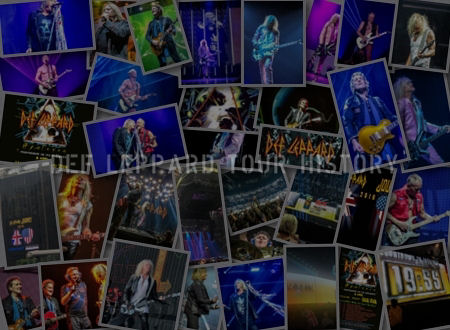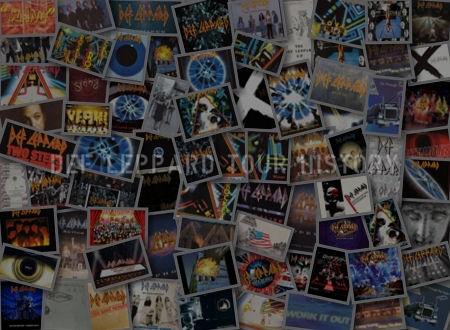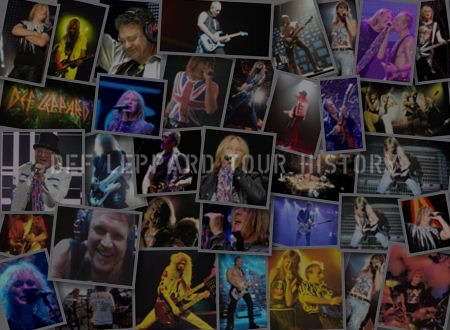

This section looks at the 'On Through The Night' album chart peak in the UK. The first studio album released by the band which featured the recent single 'Hello America'.
"We couldn't wait to get in because we had the music."
Def Leppard's classic debut album On Through The Night reached Number 15 on the UK Top 100 chart on this day in 1980.
The band's first studio album was released on 14th March 1980 and entered the chart on this day at its peak position of 18.
It would spend eight weeks on the chart. Spending two weeks at Number 15 after entering at 64.
It spent five weeks in all inside the Top 40, three in the Top 20 and fell off the chart in early May.
This would be the band's highest charting UK album until 'Hysteria' entered at Number One over seven years later in August 1987.
Johnny Mathis was at Number One on this day with his album 'Tears And Laughter' which was the highest new entry.
Other rock acts on the chart that week included The Police (8 and 13), Sammy Hagar (12), Rainbow (17), Rush (28) and Uriah Heep (39).


UK Album Chart - 29th March 1980
- 01 - Johnny Mathis - Tears And Laughter
- 02 - Rose Royce - Greatest Hits Rose Royce
- 03 - Marti Webb - Tell Me On A Sunday
- 04 - Status Quo -12 Gold Bars
- 05 - The Shadows - String Of Hits
- 15 - Def Leppard - On Through The Night - (Peak Position)
On Through The Night - October 1988 MTV Special Band Quotes
Steve Clark - "We recorded the first album at Startling Studios, which is owned by Ringo Starr in Ascot. And we had a real lot of fun making that record. That's why it sounds like it does."
Rick Savage - "It's a vague memory doing the record because it was the first time. It's like 'so this is what it's like to be in the music business' sort of thing."
Rick Allen - "I think we drank far too much."
Rick Savage - "We used to get drunk every night and still try and record. And it's like totally young kids playing at being musicians and I think that's how it sounded to me."

On Through The Night - Joe Elliott July 2011 Interview Quotes
"You know, that first record, Tom Allom produced it, God bless him. Lovely guy and a good producer. But I think his instructions from the record label must have been something like, "Just capture the band's energy, man." We'd been playing most of those songs live for 18 months. So, if anybody came along and suggested we change them in any which way, we wouldn't have been able to. We'd lived with them for so long. We just had to leave them as they were and record them as best we could. Because we knew the songs so well, we had the backing tracks down in a day. And then we spent three weeks ruining that record by doing way too many overdubs. That was the thing that we had a struggle with. It was us trying to find our way.
You know, a lot of people got a great affection for that record, but as I always say, "Yeah, but it's hardly the first Van Halen or Boston album, is it?""The one good thing about it was it gave us a launch pad to get better from. And I believe that when we got to High 'N' Dry and on to Pyromania and Hysteria, we started doing the record the first album should have been. We couldn't get Mutt [Lange] to do the first album, he wasn't available. It was fun working with Tom, but we spent most of the time drinking wine and having a good time as opposed to making a good record. I didn't really always enjoy making albums with Mutt, but I certainly enjoyed listening to them afterwards. But it's the other way around with On Through The Night."
"It's a bit naive and it could have been a better record. I would love the opportunity to take it in the studio and remix it. Sadly, the house where we recorded it, which used to be John Lennon's place in Ascot, got bought by some billionaire Arab guy. He took all the master tapes - which would have been in one of the rooms of the studio - into their outdoor pool, and filled it in with earth and put a garden over the top of them. They're lost forever."
On Through The Night - Joe Elliott 1989 Interview Quotes
"If you play the four albums back to back, you can definitely hear a progression. On the first album, On Through The Night, you hear the ideas executed very badly. On the second album, High N' Dry, you hear us getting a lot heavier but the album is very tightly recorded. The third album, Pyromania, is where we came into our own--we had the ideas, the harmonies and the arrangements of the first album, plus tightness of the third album. With Hysteria, we took it one step further."
"When Pete Willis was in the band in the early days, he was listening to a lot of Pat Travers and Judas Priest, which is where the very heavy stuff came in. Steve (Clark), our main writer, was more into Zeppelin. Sav (Rick Savage) was a big Queen fan. And I was very into the glam stuff. I like Mott The Hoople, Alice Cooper, Sweet and Slade."
On Through The Night - Producer Tom Allom Rockpages 2011 Interview Quote
"The band was very tight and it was easy to get good performances out of them. They had no fear of the studio and because I was quite a bit older than them (they were very young at the time) I think they looked on me as a kind of father figure! It was them that nicknamed me The Colonel."

BBC Radio 1 Rock Till You Drop Documentary 1993 - Interview Quotes
Def Leppard's reputation as a live act continued to grow through 1979. Meanwhile the band themselves were more than ready to record their first album.
Joe Elliott - ".We couldn't wait to get in because we had the music. We'd been playing it live for well over a year and we were bored of it. But we knew that we had to get it out of our system on to vinyl."
"And we really wanted to work with Mutt on the first album. Mutt Lange, but he was unavailable. See by the time we got recording our first album. We'd parted company with our original management and we'd signed to Leber Krebs who Peter Mensch was working for who is our now manager with Cliff Burnstein."
"And he was, because of AC/DC who were managed by Leber Krebs, he was good friends with Mutt. And we always admired his production work and wanted to work with him but he just couldn't do it."
"And we went with Tom Allom because he'd done Priest's live album, and some, I think he done some studio stuff with Priest as well. And he'd done Pat Travers."
"And it turned out Tom was a great guy to work with. He was a charming, very...we used to call him the Colonel 'cause he had this sort of like, you know, very upper class sort of accent. I think it was fake. He used to put it on. And he used to drink his wine with two fingers and three sticking out you know."
"He always ended up getting blitzed after 8pm, as we all did. So whatever got done at night normally got redone the next morning."
"But you know we blitzed through that album. We got all the backing tracks done in one day. And spent 20 days wasting our time overdubbing."
"And that's one thing we've always tried to do since then. Is it's OK spending a long time on a song if the song actually warrants exactly what you're doing. And we kind of got a, again it was just naivety on our part."
"But, you know, you sometimes you have to put your life in the hands of a producer as well and I don't think that we were very well directed at that point."
"We always have a joke about songs like Sorrow Is A Woman for example. That's the very first song that I ever wrote you know. I can kind of laugh at some of the parts of it but at the same time I still somewhere deep down something says it's not a bad effort for your very first song you know."
"And again I think a lot of them are good. I mean I like Rock Brigade. But more so in those days what we would do is just come up with guitar riffs."
"Very few of us had much idea on how the vocal would go. We always just kind of compiled this kind of collection of guitar riffs. Which were quite interesting. And kind of throw them at Joe and say you know you've gotta sing over this sort of thing."
"And that's basically in the early days how a lot of the songs came about. And it would be fair to say that Steve was probably the major contributor in that field you know."
"And since then we've all become a little bit more conscious of what Joe's gotta do. There's still room for the guitar riffs because I mean that's what makes the songs sound interesting, you know, ultimately. Provided you can get the right vocal line with it you know."
"But now as opposed to say back in 1980 I think more people are more aware of what Joe has to sing."
related pages/releases
explore def leppard tour history




